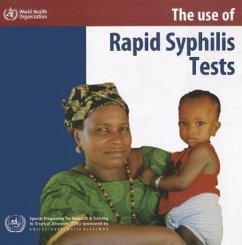Syphilis is a curable infection caused by a bacterium called Treponema pallidum. This infection is sexually transmitted and can also be passed on from a mother to her fetus during pregnancy. As a cause of genital ulcer disease, syphilis has been associated with an increased risk of HIV transmission and acquisition. Most persons with syphilis tend to be unaware of their infection and they can transmit the infection to their sexual contacts or, in the case of a pregnant woman, to her unborn child. If left untreated, syphilis can cause serious consequences such as stillbirth, prematurity and neonatal deaths. Adverse outcomes of pregnancy are preventable if the infection is detected and treated before mid-second trimester. Early detection and treatment is also critical in preventing severe long term complications in the patient and onward transmission to sexual partners. Congenital syphilis kills more than one million babies a year worldwide but is preventable if infected mothers are identified and treated appropriately as early as possible. Rapid tests for syphilis are now commercially available. These are simple point of care tests and can be performed outside a laboratory setting with minimal training and no equipment using a small amount of whole blood collected by a finger prick. Hence they can address the problems associated with lack of access to a laboratory and the low patient return rates. This useful manual provides a general overview on the use of rapid syphilis tests, their purchase, transport and storage.
Bitte wählen Sie Ihr Anliegen aus.
Rechnungen
Retourenschein anfordern
Bestellstatus
Storno







